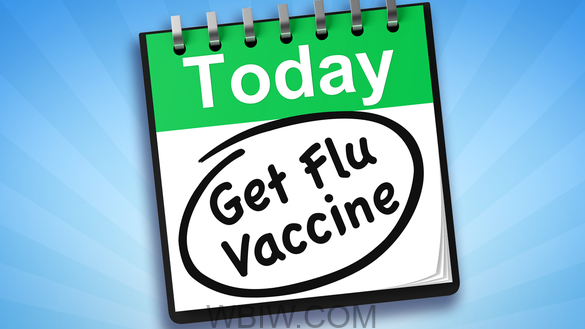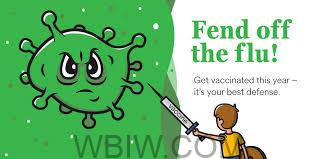
INDIANA – Haven’t had your flu shot yet? It’s not too late. And there are still good reasons to get one.
It’s likely that flu viruses and the virus that causes COVID-19 will circulate together this fall and winter. The flu vaccine will not prevent COVID-19 – but COVID-19 vaccines do!

Getting vaccinated against COVID-19 or receiving a booster with one of the currently available vaccines is the best thing that you can do right now to help protect yourself, your family, and your friends. Boosters for those 18 years of age and older help provide continued protection against COVID-19, including the serious consequences that can occur, such as hospitalization and death. Find vaccines near you at vaccines.gov.
While the U.S. remains focused on the COVID-19 pandemic, we need to also be aware of flu season as we approach winter. Influenza (flu) viruses typically spread in fall and winter, with activity peaking between December and February. Getting vaccinated now can lower your chances of getting the flu.
Flu is a serious disease, caused by influenza viruses, that can lead to hospitalization and even death. Every flu season is different, and the substantial health impacts can vary widely from season to season, with some flu seasons being worse than others. Your best defense is vaccination, which provides protection from flu and its potential complications.
The flu vaccines are approved by the U.S. Food and Drug Administration to prevent flu, and they provide important benefits. The Centers for Disease Control and Prevention estimate that during the 2019-20 flu season:
- 38 million people were ill with flu.
- 18 million people went to a health care provider for flu.
- 400,000 people were hospitalized for flu.
- 22,000 people died of influenza.
Vaccination prevented more than 7 million flu illnesses, 105,000 hospitalizations, and 6,300 flu-related deaths, according to the CDC.
COVID-19 and Flu
It’s likely that flu viruses and the virus that causes COVID-19 will circulate together this fall and winter. The flu vaccine does not prevent COVID-19. The FDA has approved one vaccine for the prevention of COVID-19 and has issued emergency use authorizations (EUA) for three vaccines to prevent COVID-19.

Meanwhile, the flu vaccines are approved by the FDA for the prevention of influenza disease and to protect against four different virus strains of influenza. Getting vaccinated to prevent this disease can help keep you out of the doctor’s office for a sick visit and preserve health care resources for patients with other diseases and medical conditions, including COVID-19.
Flu viruses are spread by droplets when people infected with the flu cough, sneeze or talk. Flu may also be spread when a person touches a surface or object that has flu viruses on it and then touches their own mouth, nose, or eyes.
The CDC recommends that adults and children older than 6 months get a flu vaccine.
For more information on flu vaccine recommendations, visit this CDC page.
If you have already been sick with the flu this season without getting vaccinated, getting a flu vaccine is still important because it helps prevent disease caused by four different strains of flu viruses. Presumably, you were infected with one type of flu virus strain, so the vaccine would offer protection against the strains that you haven’t already had.



